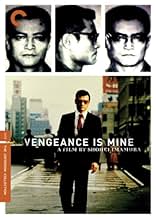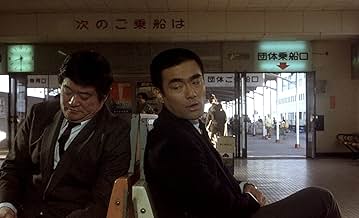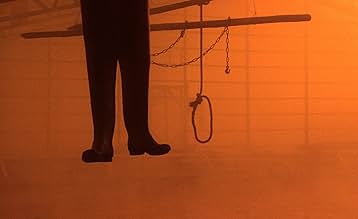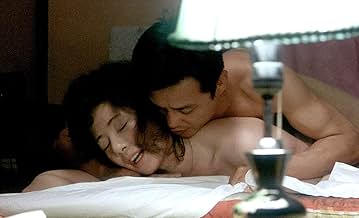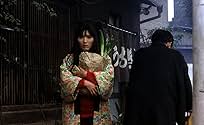VALUTAZIONE IMDb
7,7/10
7694
LA TUA VALUTAZIONE
Aggiungi una trama nella tua linguaChronological exploits of Iwao Enokizu, a murderous thief on the run.Chronological exploits of Iwao Enokizu, a murderous thief on the run.Chronological exploits of Iwao Enokizu, a murderous thief on the run.
- Regia
- Sceneggiatura
- Star
- Premi
- 21 vittorie e 6 candidature totali
Recensioni in evidenza
In late 1963 a serial killer and conman Akira Nishiguchi gained nationwide attention in Japan by murdering five people, several of them while on the run from the police. In the late 1970s a book based on his life inspired the master director Shôhei Imamura to use his story as the basis for a cold crime film titled Vengeance Is Mine. The film starts with the capture of the killer Iwao Enokizu (Ken Ogata) and advances non-chronologically, depicting the detectives interviewing his family and former lovers and how Enokizu first came to know them. Particularly the muted relationship of Iwao's wife Kazuko (Mitsuko Baisho) and his Catholic father Shizuo (Rentarô Mikuni) is paid attention to, so is his stay at a brothel-like inn managed by Haru Asano (Mayumi Ogawa) and her ex-con mother Hisano (Nijiko Kiyokawa). The scenes ranging from Enokizu's childhood to his time in death row cast light on what kind of man he is, but avoid serving easy, clear-cut explanations of his inner motives.
Imamura has taken an unspectacular, down-to-earth approach to his enigmatic subject. Some techniques, such as identifying the victims' names and causes of death by subtitles, are not far from the style of documentaries. While some of Enokizu's killings take place off-screen, the depicted murder scenes are not softened by turning the camera away or fading to black, making especially the sexual violence hard to watch for sensitive viewers. Still, Vengeance Is Mine is more of a character study than a crime thriller, as in the latter parts of the film the detectives' role is diminished and the focus turned to Enokizu. He is portrayed as having been belligerent and self-confident from young age, soon blossoming into a full-blown psychopath to whom other people's feelings are of little concern, as exemplified by his cruel psychological treatment of his family. Even if Iwao's basic nature is inherent, it could be possible that the suppressed atmosphere in his parents' home has affected the way he turned out: the deeply Christian father sparks Iwao's hatred for weakness and humility, prompting him to openly mock the lack of action from the family's part when feelings develop between Kazuko and Shizuo.
Besides his twisted relationship with his family, another defining element in the film is Enokizu's stay at the inn with Haru, a mistreated woman who has to look after her unreliable mother. Imamura's portrayal of Haru is highly forlorn; to her Iwao's presence represents a possibility of freedom from her gloomy life, even when his past is no longer a secret to her. It is also during this time when the stress of being a fugitive is starting to take its toll on Enokizu; he turns from a self-confident fraudster to a more serene and openly menacing figure, an interesting change as we, the audience, already know him as cocky and carefree from the first scene that has yet to happen in the story's timeline.
The very dark lighting in the interior scenes and the slow-paced, detached storytelling will alienate those expecting a suspenseful serial killer thriller, but as a flat-out drama Vengeance Is Mine provides a fascinating trip into the world of the suave killer. Ken Ogata handles the lead role with natural charm, effortlessly fitting in the various roles Enokizu assumes over the course of the film. Rentarô Mikuni also makes a great counterforce to him as the guilt-ridden father, but especially the unlucky women Haru and Hisano are powerfully brought to life by Ogawa and Kiyokawa. The visuals are not as aesthetically striking as in Imamura's earlier masterpiece Unholy Desire (1964), but the mood is so heavily tied to the reality of Japanese society in the 1960s and 70s that the depressing mundanity of the surroundings is never out of place. The only moment rising above the strictly realistic atmosphere would be the very final scene on the top of a mountain: Enokizu's spirit will remain lingering in the lives of those around him. All in all, Vengeance is Mine should not be ignored by any enthusiast of crime cinema, but admirers of slow-burning character dramas are probably the ones to find it the most rewarding.
Imamura has taken an unspectacular, down-to-earth approach to his enigmatic subject. Some techniques, such as identifying the victims' names and causes of death by subtitles, are not far from the style of documentaries. While some of Enokizu's killings take place off-screen, the depicted murder scenes are not softened by turning the camera away or fading to black, making especially the sexual violence hard to watch for sensitive viewers. Still, Vengeance Is Mine is more of a character study than a crime thriller, as in the latter parts of the film the detectives' role is diminished and the focus turned to Enokizu. He is portrayed as having been belligerent and self-confident from young age, soon blossoming into a full-blown psychopath to whom other people's feelings are of little concern, as exemplified by his cruel psychological treatment of his family. Even if Iwao's basic nature is inherent, it could be possible that the suppressed atmosphere in his parents' home has affected the way he turned out: the deeply Christian father sparks Iwao's hatred for weakness and humility, prompting him to openly mock the lack of action from the family's part when feelings develop between Kazuko and Shizuo.
Besides his twisted relationship with his family, another defining element in the film is Enokizu's stay at the inn with Haru, a mistreated woman who has to look after her unreliable mother. Imamura's portrayal of Haru is highly forlorn; to her Iwao's presence represents a possibility of freedom from her gloomy life, even when his past is no longer a secret to her. It is also during this time when the stress of being a fugitive is starting to take its toll on Enokizu; he turns from a self-confident fraudster to a more serene and openly menacing figure, an interesting change as we, the audience, already know him as cocky and carefree from the first scene that has yet to happen in the story's timeline.
The very dark lighting in the interior scenes and the slow-paced, detached storytelling will alienate those expecting a suspenseful serial killer thriller, but as a flat-out drama Vengeance Is Mine provides a fascinating trip into the world of the suave killer. Ken Ogata handles the lead role with natural charm, effortlessly fitting in the various roles Enokizu assumes over the course of the film. Rentarô Mikuni also makes a great counterforce to him as the guilt-ridden father, but especially the unlucky women Haru and Hisano are powerfully brought to life by Ogawa and Kiyokawa. The visuals are not as aesthetically striking as in Imamura's earlier masterpiece Unholy Desire (1964), but the mood is so heavily tied to the reality of Japanese society in the 1960s and 70s that the depressing mundanity of the surroundings is never out of place. The only moment rising above the strictly realistic atmosphere would be the very final scene on the top of a mountain: Enokizu's spirit will remain lingering in the lives of those around him. All in all, Vengeance is Mine should not be ignored by any enthusiast of crime cinema, but admirers of slow-burning character dramas are probably the ones to find it the most rewarding.
I think this movie is an all around tour-de-force depiction of a sociopath. All aspects of this movie are superb. The main actor gives a truly chilling and convincing portrayal of a man with no conscience, at the same time giving his character great depth and complexity. Aside from being based on true events, this cold blooded murderer is much more realistic than the clever game-playing types portrayed in such films as "Silence of the Lambs". I would highly recommend this movie to all but the squeamish.
Vengeance is Mine (1979) is a truly powerful film; an elliptical reconstruction/personal examination into the criminal mind, presenting a number of potential questions as to why this character became the person that he did, but offering us nothing in the way of easy answers. It is anchored by the central performance of Ken Ogata as Iwao Enokizu, a thirty-something tearaway and con artist who one day murders two men, seemingly for financial benefit, and in the process, triggers one of the largest and most infamous manhunts in Japanese history. Whereas the story presents numerous avenues of thought and situations that recall the very best of Hollywood serial killer films, crime fiction or the cinema of investigation, the film refuses to conform to any of this; giving us a juxtaposing mood wherein elements of documentary-like realism are cross-cut with a more enigmatic element of self-reflection, memory and examination.
Given this particular presentation, Vengeance is Mine can be seen as something of a difficult film; employing a fractured timeline that takes in thirty years of Iwao's family history, as well as offering us a central narrative perspective that seems to have been woven together from a number of different, highly conflicting viewpoints. Illustrating this device, director Imamura begins the film with the capture of Iwao and his transportation back to police HQ. From here, we cut to the police inspectors interrogating the murderer, who taunts them with his flippant behaviour, uncooperative attitude and provocative questioning before a chain of events begins to form. Here, Imamura juggles the narrative perspective of Iwao with that of the police, so that we are never quite sure if what we're seeing is a recreation of police evidence or the word of a man that we cannot really trust. As the film progresses, other characters will be introduced, and all of them will in some way contribute towards fleshing out the story in such a way that continues this idea of a patchwork narrative, or conversely, what film critic Tony Rayns refers to as "the lines of thought".
The effect that Imamura's structure has on us is at times staggering; cutting to a scene of spiralling family turmoil in between moments of murder and seduction, in a way that both disarms and distracts us; forcing us to ask questions and connect the dots as it were to try and pin point Iwao's exact reason for this misanthropic violence and rage. Later in the film, more surreal and enigmatic moments will be added to offer further shades of reference, accumulating as we crawl closer and closer to a final that we hope will tie these issues together, but instead, leaves us with even more questions pertaining to the complex ideas regarding love, honour, family, faith, society, spirituality, regret, rage, murder, life and death. This presents a stark irony to the film. Whereas the structure of the script and the presentation of the characters and narrative are incredibly complicated and vague, Imamura's direction is subtle and as light as a feather.
Perhaps drawing somewhat on his past work in documentary-directing, the style of Vengeance is Mine has an uncomplicated minimalism and sense of urgency. Imamura makes great use of cramped, claustrophobic interiors, from the police car in the opening sequence, to the interrogation scenes, to the sequences between Iwao and the owner of a hotel where he later hides out. He also captures the spirit of 60's Japan, moving from the small islands and villages with their old ways and traditional values, to the bright lights of the city and a beguiling underworld of crime and prostitution. Much of the film is shot in a very light, cinéma-vérité style with hand-held cameras or locked off shots framed through windows and doorways, with the use of extensive on-screen inter-titles to announce the names of victims, the date and times of death, and the choice of murder weapon. Again, this appropriation of style and the emphasis on examination and a certain presentation of reality in all its sordid detail is very much keeping with Imamura's previous documentary work, and the lurid, real-life aspect of Iwao Enokizu's unprovoked double-murder, and the gruelling 78 day manhunt that followed.
In keeping with this uncomplicated visual approach, the violence of Vengeance is Mine is stark, uncompromising and brutal. As ferocious and provocative as the central performance from Ken Ogata and as cold and unsympathetic as the murders in Kieslowski's A Short Film About Killing (1988). Given Iwao's character, and Imamura' refusal to take sides regarding these complicated issues - presenting the drama from a distance and allowing the audience the opportunity to make up their own mind regarding the various rights and wrongs - Vengeance is Mine will definitely be a difficult work for many viewers. Iwao is such an unlikable and unsympathetic character and yet, we watch the film unfold through his eyes and share in his thoughts, feelings, lies and disappointments. The title is also misleading and vague; tapping into the ideas of Catholicism central to the plot but in no way representing the view point of any of these characters.
Ultimately, Vengeance is Mine requires thought and consideration on the part of the audience to pick apart the various sub textual ideas presented by the narrative and the matter of fact way in which the direction comments on them. There are clear ideas of family, with the relationship between husband and wife, father and son, mother and son all driving Iwao to commit these crimes and show no sympathy, as well as cultural and spiritual taboos central to the Japanese culture of the post war era. The highly enigmatic ending also adds further shades that require personal interpretation, with the last five minutes presenting something vaguely surreal and undoubtedly thought provoking. Vengeance is Mine is a bold and provocative work that forces the viewer to ask some serious questions, with no guarantee of any easy answers, and remains a powerful and uncompromising work of intelligent cinema.
Given this particular presentation, Vengeance is Mine can be seen as something of a difficult film; employing a fractured timeline that takes in thirty years of Iwao's family history, as well as offering us a central narrative perspective that seems to have been woven together from a number of different, highly conflicting viewpoints. Illustrating this device, director Imamura begins the film with the capture of Iwao and his transportation back to police HQ. From here, we cut to the police inspectors interrogating the murderer, who taunts them with his flippant behaviour, uncooperative attitude and provocative questioning before a chain of events begins to form. Here, Imamura juggles the narrative perspective of Iwao with that of the police, so that we are never quite sure if what we're seeing is a recreation of police evidence or the word of a man that we cannot really trust. As the film progresses, other characters will be introduced, and all of them will in some way contribute towards fleshing out the story in such a way that continues this idea of a patchwork narrative, or conversely, what film critic Tony Rayns refers to as "the lines of thought".
The effect that Imamura's structure has on us is at times staggering; cutting to a scene of spiralling family turmoil in between moments of murder and seduction, in a way that both disarms and distracts us; forcing us to ask questions and connect the dots as it were to try and pin point Iwao's exact reason for this misanthropic violence and rage. Later in the film, more surreal and enigmatic moments will be added to offer further shades of reference, accumulating as we crawl closer and closer to a final that we hope will tie these issues together, but instead, leaves us with even more questions pertaining to the complex ideas regarding love, honour, family, faith, society, spirituality, regret, rage, murder, life and death. This presents a stark irony to the film. Whereas the structure of the script and the presentation of the characters and narrative are incredibly complicated and vague, Imamura's direction is subtle and as light as a feather.
Perhaps drawing somewhat on his past work in documentary-directing, the style of Vengeance is Mine has an uncomplicated minimalism and sense of urgency. Imamura makes great use of cramped, claustrophobic interiors, from the police car in the opening sequence, to the interrogation scenes, to the sequences between Iwao and the owner of a hotel where he later hides out. He also captures the spirit of 60's Japan, moving from the small islands and villages with their old ways and traditional values, to the bright lights of the city and a beguiling underworld of crime and prostitution. Much of the film is shot in a very light, cinéma-vérité style with hand-held cameras or locked off shots framed through windows and doorways, with the use of extensive on-screen inter-titles to announce the names of victims, the date and times of death, and the choice of murder weapon. Again, this appropriation of style and the emphasis on examination and a certain presentation of reality in all its sordid detail is very much keeping with Imamura's previous documentary work, and the lurid, real-life aspect of Iwao Enokizu's unprovoked double-murder, and the gruelling 78 day manhunt that followed.
In keeping with this uncomplicated visual approach, the violence of Vengeance is Mine is stark, uncompromising and brutal. As ferocious and provocative as the central performance from Ken Ogata and as cold and unsympathetic as the murders in Kieslowski's A Short Film About Killing (1988). Given Iwao's character, and Imamura' refusal to take sides regarding these complicated issues - presenting the drama from a distance and allowing the audience the opportunity to make up their own mind regarding the various rights and wrongs - Vengeance is Mine will definitely be a difficult work for many viewers. Iwao is such an unlikable and unsympathetic character and yet, we watch the film unfold through his eyes and share in his thoughts, feelings, lies and disappointments. The title is also misleading and vague; tapping into the ideas of Catholicism central to the plot but in no way representing the view point of any of these characters.
Ultimately, Vengeance is Mine requires thought and consideration on the part of the audience to pick apart the various sub textual ideas presented by the narrative and the matter of fact way in which the direction comments on them. There are clear ideas of family, with the relationship between husband and wife, father and son, mother and son all driving Iwao to commit these crimes and show no sympathy, as well as cultural and spiritual taboos central to the Japanese culture of the post war era. The highly enigmatic ending also adds further shades that require personal interpretation, with the last five minutes presenting something vaguely surreal and undoubtedly thought provoking. Vengeance is Mine is a bold and provocative work that forces the viewer to ask some serious questions, with no guarantee of any easy answers, and remains a powerful and uncompromising work of intelligent cinema.
Far from a film that explores the "whydunit?" of a ruthless but charming murderer, Vengeance of Mine bristles with all the energies Imamura believes the real Japanese possess. These people are in lower social positions and just trying to survive the brutality of day-to-day struggles. In their energy, courage, and perseverance to survive, Vengeance of Mine becomes beautiful and captivating to watch.
Admittedly, it is quite difficult to understand such stereotypes as murderer, tempted Catholic, prostitute, pimp/hotel owners, and delivery men as eccentric individuals in the space of two hours. But oddly enough, I feel a strange sense of familiarity in the hustle and bustle of these characters in the story. They may live their lives teetering on what is considered socially acceptable or healthful, but Imamura presents them with such respect and curiosity (of an anthropologist?!) - that I cannot resist feeling their robust lives leaping off the screen. In this way their seemingly bizzare and extreme behavior are very convincing, very real, and very touching.
Highly recommended for the challenging story (flashbacks, vignettes, illogical twists and turns of story and visual), quirky pace, idyllic country scenes, and the wonderful performance of Ken Ogata.
Admittedly, it is quite difficult to understand such stereotypes as murderer, tempted Catholic, prostitute, pimp/hotel owners, and delivery men as eccentric individuals in the space of two hours. But oddly enough, I feel a strange sense of familiarity in the hustle and bustle of these characters in the story. They may live their lives teetering on what is considered socially acceptable or healthful, but Imamura presents them with such respect and curiosity (of an anthropologist?!) - that I cannot resist feeling their robust lives leaping off the screen. In this way their seemingly bizzare and extreme behavior are very convincing, very real, and very touching.
Highly recommended for the challenging story (flashbacks, vignettes, illogical twists and turns of story and visual), quirky pace, idyllic country scenes, and the wonderful performance of Ken Ogata.
This dark masterpiece pushes to the limits of my toleration for violence and sex. We get to watch the "how", "when", "where" of the story of the murderous sociopath (brilliantly portrayed by Ken Ogata) but are denied any convincing "why" by Imamura. This film seemed to have echoes of Poe -- another master at combining humor with the horrific and macabre. When it comes to cinema, though, there is no other master anything like Imamura.
No aspect of this film (acting, cinematography, script) is less than impressive. A recent 2 DVD set from Panorama (a Hong Kong company) provides English subtitles and is technically adequate (albeit far from superlative).
No aspect of this film (acting, cinematography, script) is less than impressive. A recent 2 DVD set from Panorama (a Hong Kong company) provides English subtitles and is technically adequate (albeit far from superlative).
Lo sapevi?
- QuizBased on true story of serial killer Akira Nishiguchi.
- BlooperFlashback scene taking place in 1946 features an American flag containing 50 stars on the back of a US Army Jeep. The US flag in 1946 featured only 48 stars in even rows and columns of six.
- Citazioni
Shizuo Enokizu: You can only kill those who never harmed you.
- ConnessioniFeatures La grande battaglia (1971)
I più visti
Accedi per valutare e creare un elenco di titoli salvati per ottenere consigli personalizzati
- How long is Vengeance Is Mine?Powered by Alexa
Dettagli
- Data di uscita
- Paese di origine
- Sito ufficiale
- Lingue
- Celebre anche come
- Vengeance Is Mine
- Luoghi delle riprese
- Kannawa Hot Spring, Beppu, Oita, Giappone(Murder Scene)
- Aziende produttrici
- Vedi altri crediti dell’azienda su IMDbPro
Botteghino
- Lordo Stati Uniti e Canada
- 11.891 USD
- Lordo in tutto il mondo
- 21.452 USD
Contribuisci a questa pagina
Suggerisci una modifica o aggiungi i contenuti mancanti



